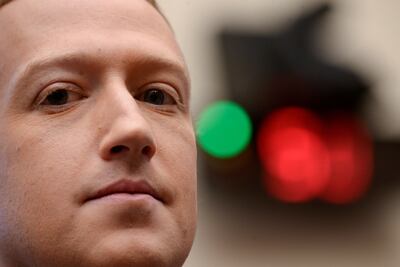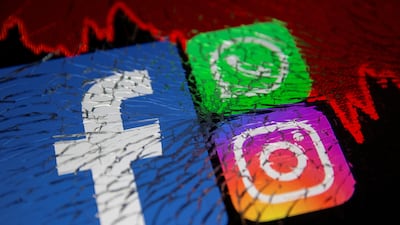I can’t make so much as a dentist appointment without turning to WhatsApp. It is incredibly convenient – far more than logging into a clunky online portal and navigating a slow-loading calendar of available appointments.
Daily life in the UAE, and across the Middle East in general, is often a WhatsApp-based existence.
It is useful and yet I hate it. I hate the dependency on a single piece of infrastructure that is largely unaccountable to any public authority.
And it is only on days like yesterday, when the app, along with Facebook and Instagram, which are owned by the same company, suffered a prolonged outage that my hatred starts to feel validated.
If tomorrow all the phone lines in the world went dead or GPS satellites fell from the sky, the firing of those responsible would only be the beginning. Inquiries would be held, compensation would be paid and new laws would be passed in the US, Europe and elsewhere to ensure that these things would never happen again.
It is not an entirely trivial comparison. We still don’t know the full extent of the consequences of WhatsApp going dark, but we will come to know, I’m sure, that they were many. To give just one example, reports have already emerged telling how vulnerable Afghans trying to escape the Taliban were unable to reach those trying to co-ordinate their rescue, causing potentially dangerous delays.
But Facebook, the company founded by Mark Zuckerberg that owns WhatsApp, is unlikely to see much in the way of lasting consequences. An executive few have heard of may be fired, the stock price will fall for a time, but not much else will happen.
The only thing we have seen so far is a simple “We’re sorry”, posted by Facebook’s official account, ironically, on Twitter.
But we ought to be past the point of dry apologies. They are not cute.
For the past decade – first running a tech-based non-profit and then as a reporter covering the industry – I have grown increasingly distrustful of Mr Zuckerberg’s social media empire. Not that I deserve a gold medal, but I deleted my Facebook and Instagram accounts years ago. Deleting WhatsApp, as most of the 600 million people who live in the Middle East know, is next to impossible.

The harm caused by social media apps and the lack of regulation and consequences for them feels like the first draft of the Digital Revolution. Like the noxious fumes and servile rhetoric many of our ancestors inhaled in factories during the Industrial Revolution, our grandchildren will be scandalised to learn about the lives we led under the Big Tech regime.
We are the first generation, the pioneers, and the reforms and protections we need have not yet arrived. So it seems wise to proceed with caution.
Instead, however, we have rushed forward. One in three people on the planet uses Facebook. And they do so without proper regulatory oversight.
This week, a whistleblower who was formerly employed as a product manager for Facebook told reporters that the company actively fails to protect users. “Facebook over and over again chose to optimise for its own interests like making more money,” she said.
One study included in documents the whistleblower revealed shows that Facebook took action on as little as 3 per cent to 5 per cent of hate speech on its platform, and on less than 1 per cent of content classified under “violence and incitement”.
So we have a platform, or series of platforms owned by a private individual, that works to monopolise communication in our lives, fails to protect us from the most harmful communication it propagates and then offers little more than an apology when it accidentally shuts down communication altogether.
What kind of regulations are needed? There are many ideas, but there is little agreement. That is why nothing has been done yet. The best ideas in concept involve treating Facebook like any other public utility, which would mean making its governance structure directly accountable to governments and putting controls in place to ensure that its profit incentives do not grow out of hand.
But this would be no ordinary public utility with obvious borders or boundaries. It is a global one, and national governments do not have much luck – or authority – in governing global phenomena. At the moment, Facebook, something many would consider to be a critical piece of infrastructure for people in the Middle East, is becoming increasingly harmful because of the failure of politicians in Washington to regulate it. But should politicians in Washington be the ones to regulate a piece of critical infrastructure in the Middle East anyway? It is a tough question, but one way or another oversight is needed. The status quo is not the right way to start the Digital Revolution.
Last month, US outlets carried a wonderful story of an indigenous Tatuyo woman, living in the middle of the Amazon rainforest, who has found viral stardom educating the world on TikTok about what life is like for her community. That is a mission that could only be achieved in the social media age. Using these platforms to broaden our horizons is the best realisation of their capabilities.
But we need to be honest: at the moment, big tech companies are not driving us in that direction. For most of us, our time using social media is not exposing us to diverse opinions or lives. It is, as Facebook’s whistleblower says, dedicated to activities and opinions that are causing us harm without us even knowing it. And the October 4 outage reminded us just how dependent we have become on that system. And it showed us, most of all, that we can expect little more from that system than an empty apology.









